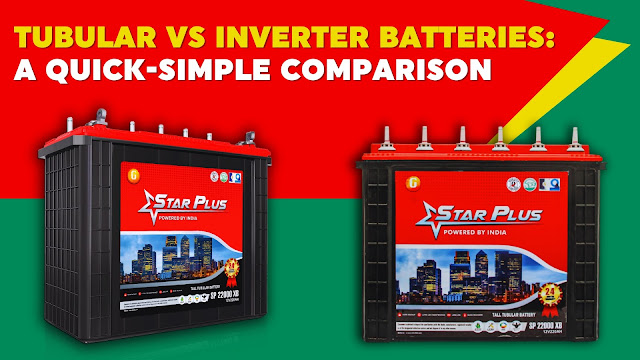As someone living in Nigeria, you already know how intimidating the situation becomes when there's a power outage. In fact, over 80% of around 28.9 million households in Nigeria do not have access to power supply from the national grid. So, whether you are a private company or a homeowner facing challenges performing the chores, there's a solution. The inverter batteries come to your rescue with reliable backup power.
So, if
the unpredictable power grid is disrupting your daily life in Nigeria, buy the
best type of inverter battery and continue activities without relying on the
national grid. This post offers a detailed understanding of Nigeria's types of
inverter batteries. Also, if you are a first-timer worrying about the
selection, you can get an insight into the best type of battery available in
the market.
Understanding
the Various Types of Inverter Batteries Available in Nigeria
Searching
for the right inverter battery is a challenge for many. So, if you are confused
about the types and other details, let's find out more from the following
section:
Lead-Acid
Batteries
A
lead-acid battery is a favourite among busy homeowners because of its
affordability and reliability. The battery is rechargeable easily and operates
with the help of sulfuric acid and lead. In this type, the lead is submerged in
sulfuric acid. This facilitates a controlled chemical reaction that generates
electricity. The reaction is reversible, which further lets the battery
recharge easily.
The
reason why lead-acid batteries are popular is because of their longer lifespan
compared to other types. Besides, they are cost-effective, which makes them an
excellent choice for budget-friendly individuals. However, one should always
charge the lead-acid batteries over an extended period of time. Note that they
might perform poorly during the high discharge periods.
Lithium-Ion
Batteries
The high
charge-to-weight ratio makes lithium-ion batteries a top choice. These
lightweight batteries ensure speedy charging and excellent discharging capabilities.
This type of battery comes with a higher ratio, which is ideal for
transportation applications. Two prime reasons these batteries are suitable are
their fast charging capability and a higher discharge rate.
These
batteries can reduce downtime and do not have any memory effect. This means it
does not hamper the durability of the rechargeable battery's charge. Moreover,
lithium-ion batteries have high energy density, efficiency, and longer cycle
life.
Gel
Batteries
Gel
batteries have become immensely popular in Nigeria. The sealed lead-acid
batteries do not use liquid acid. Instead, they make use of the gelled
electrolyte. Because they are spill-proof, they are ideal for indoor
applications, especially in areas witnessing excessive temperatures.
The only
disadvantage is that they have lower energy density and take longer to charge.
Besides, they can last for up to 3 to 4 years or sometimes even longer.
Maintenance-Free
Batteries
VRLA
batteries, or maintenance-free batteries, are regarded for their ability to
recharge. Some people also define it as valve-regulated lead-acid batteries.
Their prime advantage is to reduce the hassles associated with battery acid,
which can become quite troublesome for working individuals.
Additionally,
since they do not require frequent maintenance or the addition of
water/electrolytes, they are less susceptible to explosions and spills. This
further adds to the safety of preventing overcharging.
These
batteries let you ditch the frequent maintenance checks associated with water
levels. They do not produce emissions, making them a sustainable solution for
eco-friendly customers. Best suited for indoor applications, these batteries
ensure deep discharge tolerance. This makes discharging less burdensome
compared to other types like lead-acid batteries.
Tubular
Batteries
People
in Nigeria have understood the importance of tubular batteries. They are the
most popular types of inverter battery due to their heavy-duty
applications. These lead-acid batteries come with thicker plates, which make
them durable and extremely efficient.
Introducing
the Best Type of Inverter Battery in Nigeria
You can
consider tubular inverter batteries if you live in Nigeria and need reliable
backup power for residential or commercial purposes. Compared to flat plate
inverter batteries, tubular batteries are bigger. These batters are used in
areas that witness frequent power cuts. Their applications are best for regions
that need high power during outages.
Made to
last longer than their counterparts, tubular inverter batteries have a longer
service duration. They are durable and give the best warranty period. These
batteries are designed in various dimensions. They have two different
categories: Short tubular batteries (ST and TJ) & Tall tubular batteries (TT).
Finally
Dealing
with power outages in a land like Nigeria is common. So, if you are a homeowner
or office owner, you can consider any of the above types based on your
requirements. So, after you learn about the types of batteries available in
Nigeria, you can analyse the best type of battery suitable for your
purpose.
Considering
the features and benefits of tubular batteries, it seems this battery is most
suitable regardless of the purpose. So, consult a company that manufactures
tubular batteries for a reliable power solution.







